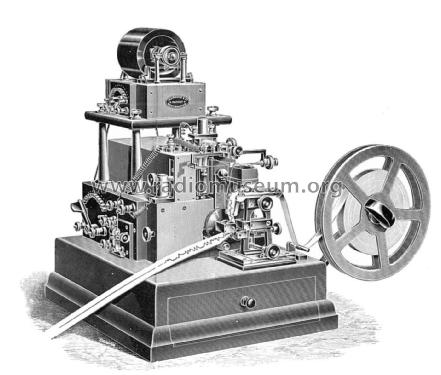Syphon Recorder
Muirhead & Co. Ltd.; Beckenham
- Produttore / Marca
- Muirhead & Co. Ltd.; Beckenham
- Anno
- 1900 ??
- Categoria
- Attrezzature Morse & TTY, RTTY, TDD etc.
- Radiomuseum.org ID
- 299042
- Gamme d'onda
- - senza
- Tensioni di funzionamento
- Varie, dettagli nelle note o non conosciuti
- Altoparlante
- - - Nessuna uscita audio.
- Materiali
- Vari materiali
- Radiomuseum.org
- Modello: Syphon Recorder - Muirhead & Co. Ltd.; Beckenham
- Forma
- Soprammobile a cassapanca o cassetta, solitamente con coperchio (NON a leggio)
- Annotazioni
-
The syphon or siphon recorder is an electromechanical device used as a receiver for submarine telegraph cables invented by William Thomson, 1st Baron Kelvin in 1867. It automatically records an incoming telegraph message as a wiggling ink line on a roll of paper tape. Later a trained telegrapher would read the tape, translating the pulses representing the "dots" and "dashes" of the Morse code to characters of the text message.
The syphon recorder replaced Thomson’s mirror galvanometer as the standard receiving instrument for submarine telegraph cables, allowing long cables to be worked using just a few volts at the sending end. The disadvantage of the mirror galvanometer was that it required two operators, one with a steady eye to read and call off the signal, the other to write down the characters received. Its use spread to ordinary telegraph lines and radiotelegraphy radio receivers. A major advantage of the syphon recorder was that no operator has to monitor the line constantly waiting for messages to come in. The paper tape preserved a record of the actual message before translation to text, so errors in translation could be checked.
- Bibliografia
- -- Original-techn. papers. (1903 Electrical Installations, vol. V, London: Caxton, pp. p. 49)
- Autore
- Modello inviato da Alan Larsen. Utilizzare "Proponi modifica" per inviare ulteriori dati.
- Altri modelli
-
In questo link sono elencati 29 modelli, di cui 24 con immagini e 1 con schemi.
Elenco delle radio e altri apparecchi della Muirhead & Co. Ltd.; Beckenham
